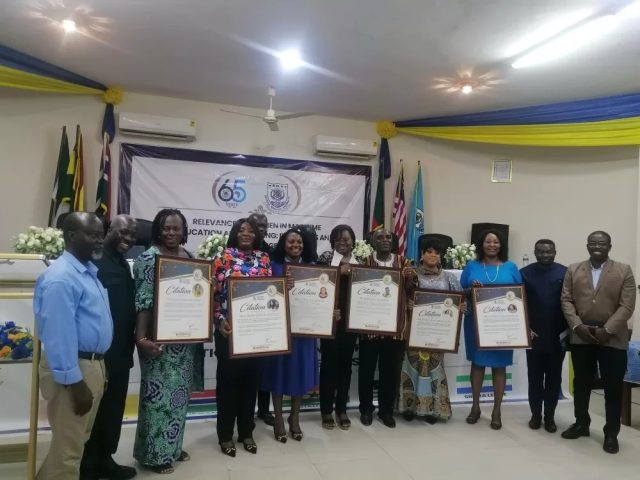By Hannah Dadzie
Stakeholders in the Maritime industry have drawn attention to the need to advance women’s role in the industry. It is estimated that two percent of the world’s Maritime workforce is made of up women, this number according to stakeholders is not inadequate. They demand a change in the narrative by enhancing opportunities for women to be educated and trained in the Maritime industry.
Speaking at a symposium organized at the Regional Maritime University in Accra, the President of the Women’s International Shipping and Trading Association, Ghana Chapter, Gertrude Ohene-Asienim, said women have capacities that can be nurtured to help the growth of the Industry and the country at large.
The Maritime industry is believed to be a conservative and massively male dominated field. Although a lot has been achieved in recent times in empowering women in the industry a lot more work needs to be done. The symposium which focused on the Relevance of Women in Maritime Education and Training: Prospects and Challenges is part of activities marking the 65th Anniversary of the University and 40 years of regionalization.
It discussed ways to help increase women participation in Maritime education and training. President of Women’s International Shipping and Trading Association, Ghana Chapter, Gertrude Ohene-Asienim said women in the industry are not recognized and celebrated adding that this narrative must change. She said although there are challenges in the industry, some women have been successfully in the field. She said there is inadequate funding and Scholarships deliberately reserved for women to pursue career progression and development in maritime education.
“Maritime education is expensive because it’s a specialized area and anything that is boarded on speciality comes with a cost that is why we are advocating for scholarships for especially women who venture into the technical area like marine engineering, nautical sciences. The industry is very big enough, we have women in different sectors. Where women have not been at the forefront the most are the technical areas because these are working in harsh conditions. We’ve seen examples of those who have been able to do it, so these success stories are there to guide,” Mrs Ohene-Asienim said.

She said there is ample evidence that investing in women is the most effective way to lift communities, companies, and even countries.
“Countries with more gender equality have better economic growth. Companies with more women leaders perform better. There are harsh conditions, especially the technical areas, and so we are trying to encourage women to overcome these fears and be able to put themselves out there,” She added.
Mrs Ohene-Asienim who is also the Executive Director of West Africa School of Shipping urged women to support each other as some become bossy when the climb to the top and others also exhibit the pull them down syndrome.
“As women, we should be there to support each other. It would be very unfortunate that a woman gets to the top and prevents other women from getting there. I think that status quo needs to change. We need to hold each other’s hand and be there for each other,” Mrs Ohene-Asienim asked.
Acting Vice Chancellor of the University, Dr Jethro W. Brooks said it has become expedient to look at the gender disparity within the maritime workforce.
“This year marks a significant milestone as we celebrate our 65th and 40th anniversaries through a series of events and activities. As we commemorate this remarkable Milestone in our history, it is imperative that we acknowledge the gender disparity within our work force.
According to the IMO, women represent a mere 2% which equates to 24,000 of the 1.89 million seafarers in the world out of which the Regional Maritime University has trained 67 female seafarers from 2018 to 2023. The University initiated a scholarship fund drive last year, primarily aimed at bolstering female representation in the maritime industry,” The Vice-Chancellor indicated.
He urged parents and guardian to encourage their daughters to venture into the industry, an arena ripe with untapped opportunities.
“Last semester, we proudly admitted three female students, and an additional ten have been accepted for the current semester.
This transformation can be driven by students who are passionate about pursuing careers in the maritime sector and by parents who encourage their daughters to venture into the realm of blue-collar jobs. I take this moment to urge more female students to step forward and enroll as seafarers, thereby reshaping the narrative and rectifying the gender imbalance,” Dr Brooks said.
According to research conducted in May 16, 2023, the inclusion of women in the maritime fields serves as a constant reminder of the pivotal role that diversity and inclusion play in this industry.
Dr Brooks hoped that the modest effort undertaken by RMU community will make a substantial impact in enhancing female participation of the sector.
Citations were given to some outstanding women who have excelled in the maritime space.


















